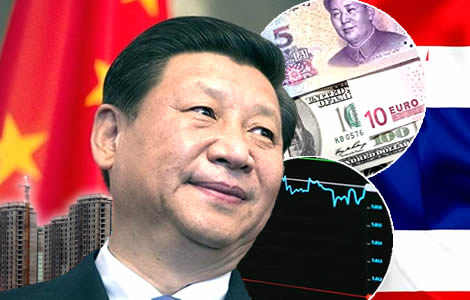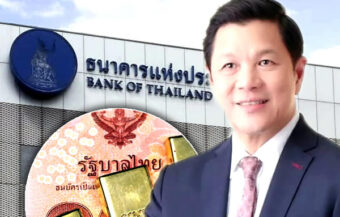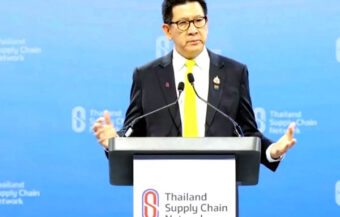As Thailand and the world battle the COVID-19 virus with Omicron knocking on the door, the bigger threat economically for us all may again be coming from China. The scale and nature of what is clearly a huge property and asset bubble in China could trigger an economic disaster in 2022 bigger than the 2008 Financial crisis.
The scale of the property market bubble in China is unprecedented and dwarfs anything seen in western economies over the last century. There is also increasing evidence that the problem extends into the banking industry as well as fears over the nature of the Chinese economy which purports to have increased its wealth by 1,333% since 2000 but where economic data is openly questioned and doubted by many senior western economists. The prospects facing the world economy may not be simply a property bubble bursting but a whole economy that may have been built on unsound or possibly even artificial foundations. The implications for the world are immense, for Thailand even more so.

On Tuesday, the Thai Minister of Finance attempted to rally confidence in what has been described as a fragile recovery of the economy in Quarter 4 as the country is still on course for a decidedly lacklustre 2021 with a projected growth rate of 1 to 1.2%, the latter figure quoted by the National Economic and Social Development Council (NESDC).
Mr Arkhom Termpittayapaisith said an economic recovery with a predicted 4% growth rate in 2022 would be driven by government investment of ฿1 trillion and fiscal stimulus. He said this compared well with the country’s recovery from the Asian Financial crisis in 1997.
Growing number of problems confront Thailand in 2022 not least the threat from a Chinese crisis
However, the outlook for 2022 is anything but clear and there are a growing number of problems that have arisen including a new wave of border closures and restrictions being introduced in export markets as anxiety grows regarding the new Omicron variant of COVID-19.
Even if the prognosis for the COVID-19 pandemic improves in the next few weeks with some signs that the new variant may be less stable and less of a clinical health danger, there are other potential storms on the horizon not least the future of the Chinese economy which is Thailand’s second-largest export market and just as importantly, very much interwoven with the country’s supply chains and Asian financial markets.
Evergrande must find $7.4 billion in bond payments in the course of 2022 as other firms also default
The growing threat posed by an imminent collapse of the China Evergrande property group could potentially trigger a worldwide economic crisis even larger than the banking crisis in 2008 and one that would hit Asia particularly hard.
Evergrande, established in 1996, is China’s largest property development firm. It has seen its bonds tumble in value in recent weeks with both Fitch and S&P Ratings predicting it will default.
The company reports assets of over $300 billion representing 2% of Chinese GDP.
It made a last gasp payment of $148 million on its bonds in early November and is taking advantage of grace periods to avoid an official default to offshore creditors.
However, a $255 million payment is due on December 28th with $7.4 billion in payments due in the course of 2022.
Chinese property market is 30% of GDP
In all, the Chinese real estate market is worth $5 trillion and makes up 30% of the country’s GDP.
Evergrande has not been able to sell a bond since January 2020 as the Covid 19 crisis has severely undermined confidence in China’s economy. Many financial taps have been switched off.
Other property firms have already defaulted such as Fantasia Holdings Group Co. in October this year which defaulted on a $205.7 million bond payment. Sinic Holdings Group Co. also in October, reneged on a $250 million note.
It is becoming increasingly clear that China is in the midst of a liquidity crisis.
Property bubble waiting to pop that may not just threaten property prices but the world’s economy
This has contributed to already well-grounded fears that the Chinese economy may be sitting on a large property bubble that is just waiting to pop, sending shock waves around the world that will hit Thailand sooner and harder than the crisis of 2008.
Figures released last week by international consulting giant McKinsey show that the world’s wealth grew by $156 trillion in the first twenty years of the new millennium from 2000 to 2020.
The calculation of wealth is based on several things but specifically excludes financial assets as both financial credit and liabilities in the system ultimately cancel each other out.
Based on the underlying figures, which rely increasingly on inflated property prices, the data appears to show that China has emerged as a wealthier country than the United States.
Worldwide, there is already evidence that property developers are starting to feel the pinch accompanied by a more challenging financial environment with interest rates in the United States set to climb.
This has led to a strengthening of the dollar against the Thai baht and other currencies in the last few weeks as investors again flee to a safe haven.
70% of China’s wealth is tied up with the property sector compared to only 35% for the US economy
According to Loomis Sayles, a US global investment house, 70% of China’s wealth is currently wrapped up in the real estate market while the figure is only 35% for the US economy.
This makes it clear why a property price collapse in China, where the property industry itself also represents a sizable 30% of the country’s GDP, will be cataclysmic and indeed may already have begun.
Prices are already on a downward trend while the country faces a range of other challenges quite similar to Thailand which includes as well as the virus pandemic, a declining birth rate and rapidly ageing population.
Wealth figures for countries around the world since 2000 explains the history of the last two decades
In 2020, China, according to McKinsey, had accumulated $120 trillion in assets while the United States only recorded $90 trillion, a figure which itself had grown by 100% or $45 trillion since 2000.
In 2000, China’s accumulated wealth stood at only $7 trillion.
The signs are ominous and point to a property bubble in the economy of Thailand’s northern neighbour, an emerging superpower that is increasingly at odds with Western powers and also expanding its armed forces at an alarming rate.
UK Foreign Secretary visits Bangkok after AUKUS security pact further raises tensions with China
The Chinese army has more than 915,000 active service troops compared to the US armed forces stationed and committed worldwide, which can muster only 486,000 soldiers.
Fears that a trapped China may be backed into a corner and is playing its last most dangerous card
The fear is that the bellicose rhetoric coming from China is linked to events since January 2020 and the potential collapse of its economic deck of cards brought about by the Covid crisis after a trade war which the United States surprisingly seems to have won given the impact of the tariffs imposed.
This year, China stunned the Pentagon when it successfully tested a hypersonic weapon that US intelligence believed was well beyond its assessed capability.
This occurred in August and followed another test in July prompting US military chiefs to describe the event as a ‘Sputnik moment’ for the United States.
China’s economic data has not made sense for a long time and its credibility was blown in January 2020
According to the McKinsey report, property accounts for 68% 0f the world’s wealth, which has never been higher or as Jan Mischke of the McKinsey Institute in Zurich puts it: ‘We are now wealthier than we have ever been.’
However, many analysts are beginning to grow wary and have begun to look afresh at the data from China. For a start, any and all economic data emerging from Beijing must be treated with caution.
This is well known by many senior economists but consistently downplayed by the world’s leading media outlets.
Not unlike the data concerning COVID-19 in the communist country from January 2020 which showed minuscule levels of infection and at times, frankly, incredulous conclusions.
This is even before considering the coverup carried out by desperate Chinese officials when the virus made itself known in late 2019.
Eyebrows were raised in 2009, for example, when China’s economy expanded by a reported 8.7% while the world’s economy fell back by 2.5%.
Yet in the last two decades, markets have been swayed and influenced to a large extent by these figures emanating from China which are tightly controlled by the Communist Party in Beijing with evidence to show that local and regional bosses faced sanctions for underperforming figures and data.
What happened in Wuhan in late 2019 is a clear example of how things can go wrong when taking Chinese data at face value and explains how the government in China works.
Officials are incentivised not to report unpalatable facts or data no matter how serious and grave the situation may be.
For decades, investors and analysts have treated Chinese data with caution although it could well be defined as a systemic hoax on a colossal scale
This is not anything new and the investment community in western countries have long interpreted Chinese economic data relying on more granular data subsets to inform themselves on the reported second-largest economy in the world.
A picture tells a thousand words and the sight of empty ghost cities and apartment towers throughout China despite its ever-growing media and internet censorship also shows us clearly what is going on.
We already know that this is a bubble but the more disturbing question is that there is the possibility that this may be something even bigger with the exposure channelled through corporate firms.
China’s corporate debt level at 160% of GDP is second only to Hong Kong at 232.2% and well ahead of both Japan at 99.9% and the United States at 73.6%.
In the past, Moodys has downgraded China’s sovereign debt rating but currently assigns the country an A1 grade with a stable outlook as does S&P despite concerns raised by zombie firms and the debt levels of local government entities.
Bubbles may burst but ultimately it is the reaction of the government and the character of those involved that determines the outcome in a financial crisis
When a bubble collapses, financial balances ultimately depend on the ability to pay. It also depends on the willingness of governments to step in and prevent a more systemic collapse.
We have already seen China Evergrande’s competitors default on loans while western bankers, as well as the media, have attempted to paper over the looming reality.
This is the same denial we saw on western media channels in the weeks leading up to the 2008 Financial crisis triggered by the collapse of Lehman Brothers on September 15th that year.
The McKinsey report shows that the growth in wealth from 2000 to 2020 has dramatically exceeded gains made in the world’s GDP during that period by 50%.
The irregular situation in China can be seen in a country that, in recent years, has boasted thousands of billionaires well above the United States as well as no less than 700 cities, many of them ghost projects.
Rising interest rates leave actors with even less room to carry on the charade that appears to be climaxing
This has been driven by artificially low interest rates which are now being challenged by rising inflation concerns which in the short term have been linked to the COVID-19 crisis and supply chains adapting to the reopening of the world economy before Omicron arrived this week.
The existence of low rates for so long has acted as an incubator for the Chinese property bubble as well as other practices within the country’s financial system.
In recent days, former US Federal Reserve boss and now Treasury Secretary Janet Yellen, said it was time to retire the phrase ‘transitory’ when discussing rising US inflation which hit a record of 16.2% in October.
She attributed the rise to a consumer emphasis on goods and a shift away from services.
She was speaking at a Reuters organised conference.
At the same time, she said she believed inflationary pressures would ease if the pandemic subsided but then there was the new Omicron variant to factor in.
‘Now the new variant, the Omicron variant, the pandemic could be with us for quite some time and hopefully does not completely stifle economic activity, but affects our behaviour in ways that contribute to inflation,’ she explained.
Power outages in China may be the strongest indicator that all is not right within its economy
Some attribute the inflation surge to reduced factory output from China where authorities, in recent months and out of the blue, rationed power supplies causing huge blackouts leaving millions of homes without power.
Guangdong in southern China, Heilongjiang, Jilin and Liaoning in the northeast were among the key manufacturing areas hit as well as other parts of the country.
The power outages, linked to higher fuel costs in China, are said to have reduced factory output to levels last seen in February 2020 at the height of the COVID-19 virus emergency in the country.
The long term effects of the pandemic on economic performance and inflation, however, may also be linked to changing societal attitudes worldwide including more local supply chains.
It has also seen a more cautious attitude towards China from US investors since January 2020 when the extent of the Covid crisis unravelled confidence.
This is believed to be the reason behind the growing liquidity crisis in the communist country which is also linked to the lack of resources to purchase fuel for its coal and oil-fired electricity supply plants when prices rocketed this year as the world economy reopened.
Goldman Sachs in New York, in a brief to investors, estimated that the blackout impacted 44% of the Chinese economy in recent months and reduced its estimated growth for the country from 8.2% to 7.8%.
Emerging crisis with underlying and long term factors such as an ageing population as in Thailand’s case
This crisis is still developing in China and is being exacerbated by other long term problems facing what is called the world’s second-largest economy, at least on paper.
As in Thailand, in China, there is also this demographic imbalance seen already in both developed and second tier developing economies which is increasingly weighing on economic performance and potential.
Cabinet in pension move as the number of working Thais to over 60s is set to half in 20 years
Thailand- the first large country with a fertility problem yet without wealth to easily fund healthcare for the old
In September, new census data in China showed that 13.5% of the country’s 1.4 billion people were aged 65 years and over. This had risen from 8.87% a decade earlier.
The country has a high level of inequality with a Gini coefficient of 0.46. This compares to a European Union average of 0.307 but is somewhat comparable to the United States at 0.43.
Thailand’s latest Gini coefficient for inequality, although the number is rising, comes in at 0.364 although other measurements and modes of analysis show a more significant problem in the kingdom which is widely accepted as the case.
Rising wealth linked with inflated property prices is a worldwide problem that has driven western politics
The McKinsey report indicates that property prices have increased by 50% more than the long term average rise in income over the last twenty years.
This is also the root cause of rising property costs including rent paid by labour and workers in developed economies which has led to the political upheavals we saw coming to the fore in 2016.
In short, the world’s economy may be sitting on a property bubble particularly centred on China which may also, at the very least, extend into other areas of the Chinese economy.
Thailand’s plans for growth in 2022 already impacted by a liquidity crisis and may be blown off course
The current outlook is that Thailand will see stronger growth at the end of 2021 with a growing number of foreign tourist arrivals.
The Tourism Authority of Thailand, on Monday, said the country could see 500,000 visitors this year while it is expected that the reopening process will continue into 2022.
Kingdom may see up to 1 million tourists this year but it will be an uphill battle to get back to 2019
Thailand pushes ahead with foreign tourism drive, may defer switch to antigen testing over Omicron
With Omicron hovering, firms already suffering a cash flow crunch with the economy again in peril
Krungsri Research is predicting that the resurrection of the sector from outright closure will help put more Thai workers back in employment and is also predicting a 5% rise in wage levels in Thailand next year.
It is predicted that exports will continue to grow and achieve a 5% growth rate for 2022.
All this is predicated on a raised level of global investment and the world economy returning to normality.
This is also coming with reports of Thai firms struggling against a local liquidity crisis with many firms not being able to finance their reopening to take advantage of the government’s efforts.
A Chinese property and financial crisis which spreads to the international markets would blow such projections, based on a benign macroeconomic environment, completely off course.
Real impact of the collapse of Evergrande which is thought to be imminent, is it another Lehman Brothers or even bigger? It is quite different
The imminent collapse of the China Evergrande Group, which owes $300 billion, could lead to a market collapse in China and worldwide. Lehman Brothers had $619 billion in debts and $639 billion in financial assets when it sparked the 2008 Financial crisis.
The subsequent liquidation, which was completed in 2019, saw all customers and secured creditors of the institution paid in full and unsecured creditors receiving 39.75 cents on the dollar.
The final outcome of the collapse of the China Evergrande Group and possibly other Chinese firms is unlikely to be so benign. It means that the world economy could ultimately be left relying on the strength and credibility of Chinese institutions. Hardly a confidence booster.
Bonds and assets of the group are currently reported to be trading in Hong Kong at an 89% discount on face value.
Use by the Communist Party of its arbitrary power only undermines China’s economy as a sham
Some commentators have even suggested that the Communist Party in China can use its arbitrary powers to arrest a collapse. This is already happening, is highly unlikely to succeed and is ultimately folly if the world is to preserve functioning and healthy markets.
That this can even be achieved is a question that is still open.
It must also be remembered that, in the 2008 Financial crisis which began in the United States, the then US Treasury Secretary, Henry Paulson, guided the Troubled Asset Relief Program (TARP) through congress in October 2008 which saved other banking giants and helped the United States and the world economy avoid a far greater crisis by saving other troubled US financial institution such as AIG, the mammoth insurance concern.
We have already seen and become accustomed to Communist Party authorities in Beijing intervening in the markets and in the affairs of large companies including the detention for some period of Ali Baba founder Jack Ma and reports of Evergrande boss Xu Jiayin being forced to sell personal assets in Hong Kong and elsewhere in an attempt to make a payment due by his firm.
Evergrande not going down without a fight
The latest news from Hong Kong is that Mr Xu has hired the services of Pollyanna Chu, a maverick Hong Kong financier who was once named as the former colony’s richest woman.
Ms Chu is now busy packaging and selling components of the Evergrande empire to meet the forthcoming bond commitments.
Estimates of the debt pile, in an entangled web of risky financing which the company built up, are also being raised now to a possible $400 billion.
However, things are unravelling fast and Chinese authorities have just stepped in to take over the Evergrande football stadium, a 100,000 seater ground built to the highest FIFA standards and reported to be the biggest in the world.
It is home to Guangzhou Evergrande Taobao FC.
Markets may not be true, a cause for even greater concern and one that should have consequences
Indeed, analysts continue to insist that this de facto power of Communist Party authorities to intervene in the commercial marketplace may be a factor in saving China’s economy from commercial forces that would be inevitable in western markets.
However, this should be cause for even greater concern and suggests that these markets are ultimately not true and not likely to be trustworthy.
This also has implications and consequences.
The long arm of the Chinese state coercing and intimidating business leaders without accountability as irregularities become more visible
The long arm of the Chinese state has been seen since 2020 not only in Ali Baba’s affairs with the abuse of Jack Ma but also extends to many other firms. In a milder case, the up and coming technology firm Tencent was recently ordered to delay the rollout of apps and to curb its expansion plans.
In October, there was an investigation into the Chinese banking sector with reported concerns that local government officials and business tycoons had compromised regional banks.
According to The Economist magazine, the institutions concerned had combined assets of $14 trillion, nearly 15% of the wealth of the United States in 2020.
Notwithstanding this, there is no denying that China is a leading exporter of products and goods.
However, significantly, the value of goods imported into the United States since 2019 initially dropped significantly because of tariffs imposed by the Trump administration in 2018 and 2019 which surprised many economists by their impact on the world’s second-largest economy.
They have been broadly retained under Biden.
Effect of US tariffs on China’s economy from 2018 has been to halt rapidly accelerating growth since 2000
In 2019, China exported $450.670 billion to the United States. In 2020, this had fallen to $434.749 billion and in the nine months to the 30th September 2021, it stood at $360.415 billion although the figures are rising again since 2020 but at a markedly slower pace.
The peak was reached in 2018 when its total exports to America came in at $538.514 billion, a 59.4% increase since the year of the financial crash in 2008 and a huge 439% increase from the figures in 2000 when exports to the USA were only recorded at $100.02 billion.
The huge growth in exports occurred after China joined the World Trade Organisation in 2001.
Consumer confidence in China is low as the party attempts to rally the public with a political campaign
The communist country’s consumers have not recovered from the COVID-19 crisis while export demand has been hit by the pandemic in western countries and now moves to sever supply chains with China.
The response of Chinese authorities has fundamentally differed from western countries with Beijing ruling out the use of fiscal stimulus such as we have seen in western countries and even in Thailand where the government has borrowed up to 16% of GDP to provide some level of support to the less well off, workers and struggling firms.
The communist regime in Beijing is portraying the current crisis in the property and banking sector as a battle between it and business tycoons in an effort to create ‘common prosperity’ which ironically resonates well with many workers and less well off people in western countries who have supported political movements to rein in globalism, essentially driven by China’s extraordinary growth as an exporter.
In a landmark speech in recent weeks, Chinese President Xi Jinping talked about a vision of a new socio-economic order by 2035 which he termed as an ‘olive tree-shaped’ society.
Commenting on the declared achievement of having eliminated entrenched rural poverty, he set a goal for ‘substantive progress’ on common prosperity by 2035.
This is the old voice of the Communist Party and is also meant for consumption by western media and western audiences as much as for an increasingly nationalistic and roiled audience at home.
How will this come about? Who will pay as evidence emerges that China’s command and control economy mixed with flunky capitalism and massaged data may be on the verge of collapse?
Western analysts and commentators are listening and beginning to think the unthinkable about the Chinese economy and the trajectory since the start of 2020
In reality, this may well be a crisis caused by wider abuses within the financial system which are behind what looks increasingly like a property bubble but may also mean something more about disorder in the Chinese economy and its market sustainability.
Already western analysts have perked up their ears and are thinking the unthinkable.
Max Zenglein is the chief economist at the Mercator Institute for China Studies based in Berlin.
He points to jargon being used by the Politburo Standing Committee of the Communist Party in Beijing which talks about a ‘dual circulation’ which means encouraging Chinese consumers to buy at home by shunning foreign-made products and goods.
New homegrown, nationalistic economy being promoted in China as western relationships plummet
This has led to a flourishing industry in traditional Chinese couture with the inexorable rise in nationalist fervour among the Chinese population in the last five years which is being openly encouraged by the government and is supported by a huge propaganda apparatus with tentacles spread far outside China.
Similar terms have been used in Thailand recently by economic planners concerning the country’s Green Economy initiative while the kingdom’s government and before that, the junta, openly encouraged a rising sense of national identity including a fad in the country also for traditional couture.
The regime in Beijing has also launched bizarre and disturbing campaigns against effeminate men, foreign consumer brands, K pop culture, video games and has also targeted firms promoting western culture and education over the last 12 months.
Cold war between China and the West is now underway as China’s economic miracle is puncturing
With a new cold war now descending on the Asia Pacific region and relations between western powers and China deteriorating, there is, however, some indication that China may be about to reverse course and begin to introduce fiscal stimulus measures in recent months.
The Atlantic Council, a pro-American think tank based in Washington DC, is predicting that we are about to see a readjustment economically but that China’s prospects are dimming.
The report was prepared using data and analysis provided by the New York-based Rhodium Group. It suggested that Beijing needs to preserve and encourage a strong private sector if its economy is to stay on track.
It says that Chinese authorities should seek to assure international investors as to the way forward to preserve the sort of outlook that once was taken for granted.
‘Without a market-oriented shift, China will struggle to maintain a growth potential that exceeds 3% annually by the middle of this decade,’ the report stated.
This, of course, excludes the prospect of an economic or financial crisis triggered by the problems now flashing red in the property and banking sector.
In any event, this is not the course that China is on right now as the economic rhetoric has become increasingly political.
Evergrande collapse could threaten the world’s financial system, a government response worldwide may be needed as the dominos fall
Respected US economist Stephen S Roach, a senior fellow at Yale University’s Jackson Institute for Global Affairs and a senior lecturer at Yale School of Management, has recently warned that the latest actions by Chinese authorities are undermining its economic future.
Mr Roach attacked its plans for redistribution and more regulation of its economy as a policy which ‘strikes at the heart of the market-based approach’ which he attributed to China’s perceived economic miracle since the 1980s.
In the meantime, fears are mounting about China Evergrande.
Last Sunday, one German analyst based in Switzerland, Dr Marco Metzler, speaking with the UK’s Daily Express newspaper warned that the company’s collapse could threaten the world’s financial system.
He said the prospect was even more serious than that posed by the collapse of Lehman Brothers and the ensuing collapse of the market which led to strong government interventions in the United States and Europe in 2008 and 2009.
While much has been made of the $1.1 trillion owed by the US to China in government bonds, it should be noted that Japan holds $1.277 trillion while even the United Kingdom and Ireland hold $452.9 billion and $322.9 billion respectively.
China’s cash reserves stood at $3.21 trillion in October 2021.
The bigger story is, however, the $27 trillion owed by corporate Chinese firms, much of it run-up in the last twenty years. This represents 160% of China’s annual GDP claim which is 30% based on property valuations.
‘This is the first domino of the collapse of the market. It will be even worse than the 2008 financial crash,’ Dr Metzler warns. ‘The market is bigger than what the US was.’
Join the Thai News forum, follow Thai Examiner on Facebook here
Receive all our stories as they come out on Telegram here
Follow Thai Examiner here
Further reading:
With Omicron hovering, firms already suffering a cash flow crunch with the economy again in peril
UK Foreign Secretary visits Bangkok after AUKUS security pact further raises tensions with China
Trade pact with Hong Kong as Thailand negotiates both Chinese and new western trade relationships
US Ambassador resigns as Biden Presidency starts with growing tensions with China over Taiwan
RCEP deal agreed as India opts out – busy Bangkok ASEAN summit concludes on a low key
Chinese FM to visit Thailand in a Covid battered world of raised tensions and potential conflict
Prime Minister indicates that the cabinet reshuffle will be complete very shortly with no problem
Thailand’s economy has become dependent on government expenditure to stay above water
Thailand and US aim for a new more ‘proactive’ trading relationship as ambassador meets Prayuth
Rice price spike but drought conditions to recede – security concern for the Mekong river
US suspension of Thai preferential trade partner status part of Trump’s ongoing trade war


















